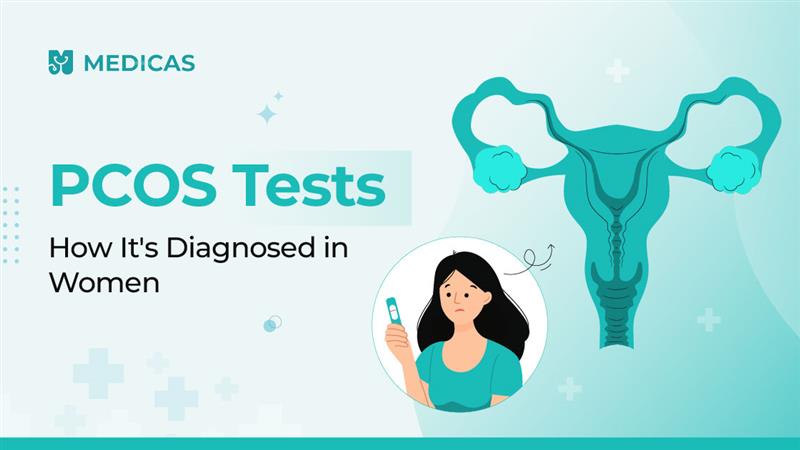Polycystic Ovary Syndrome (PCOS) is one of the most frequently diagnosed endocrine disorders in women of reproductive age. Yet, despite how common it is, many women struggle with delayed or missed diagnoses often due to the condition’s varied symptoms and lack of awareness about what PCOS diagnosis tests actually involve. As a medical professional, I often meet patients who come in with irregular periods, persistent acne, sudden weight gain, or excess hair growth, unsure of what’s happening to their bodies. One of the most common questions I hear is: “How is PCOS diagnosed?” The answer isn’t always straightforward because PCOS is a complex condition. It doesn’t have a single definitive test—instead, diagnosis is based on a combination of clinical signs, blood tests, and imaging studies. In this article, I’ll break down the best tests to diagnose PCOS, what each one looks for, and why a proper diagnosis matters. We’ll also explore the different types of PCOS tests, ranging from hormonal tests to ultrasound procedures and how they help confirm the condition, especially in teenage girls and young women. Understanding your options can make a huge difference in taking control of your health and fertility.
What is PCOS?
Polycystic Ovary Syndrome (PCOS) is a common hormonal disorder among women of reproductive age. Understanding PCOS diagnosis tests is crucial for early detection and management. This condition can lead to a variety of symptoms and long-term health issues if left unaddressed. Recognizing the signs and seeking appropriate medical advice are the first steps in managing PCOS effectively. Many women often search for “how is PCOS diagnosed” and this article will provide detailed answers.
Common Symptoms of PCOS
Symptoms of PCOS can vary widely among women, but some of the most common include:
- Irregular menstrual cycles
- Excess hair growth (hirsutism)
- Acne
- Weight gain
- Difficulty getting pregnant
Experiencing one or more of these symptoms warrants further investigation and possible PCOS medical diagnosis.
Causes and Risk Factors
The exact cause of PCOS is still not fully understood, but current research suggests that it results from a complex interaction of genetic, hormonal, and lifestyle-related factors. Many women with PCOS have a family history of the condition, indicating a possible hereditary link. If your mother or sister has PCOS, your chances of developing it are significantly higher.
- One of the most well-established risk factors is insulin resistance, a condition in which the body’s cells become less responsive to insulin, leading to higher blood sugar levels and prompting the ovaries to produce more androgens (male hormones).
- Elevated androgen levels can interfere with normal ovulation and contribute to symptoms like acne, excessive hair growth, and irregular periods.
- Other contributing factors may include obesity, low-grade inflammation, sedentary lifestyle, and exposure to certain environmental toxins.
While these do not directly cause PCOS, they can worsen hormonal imbalances and trigger symptoms in those who are genetically predisposed. Understanding these risk factors is essential for early detection and prevention of long-term complications like type 2 diabetes, infertility, and cardiovascular disease
Types of PCOS
PCOS can manifest in different forms, primarily driven by different hormonal imbalances and metabolic issues:
- Insulin-Resistant PCOS: This type is characterized by insulin resistance, which can lead to high insulin levels and androgen excess.
- Inflammatory PCOS: Inflammation can trigger androgen production and disrupt ovulation.
- Post-Pill PCOS: Some women experience PCOS symptoms after stopping birth control pills, which can mask underlying hormonal imbalances.
- Adrenal PCOS: This rarer type is caused by high levels of adrenal androgens.
How is PCOS Diagnosed?
Diagnosing PCOS typically involves a combination of medical history review, physical examination, and various PCOS blood tests. There’s no single test to definitively diagnose PCOS, so doctors usually rely on the Rotterdam criteria, which requires the presence of at least two of the following three features:
- Irregular or absent periods
- Signs of high androgens (like hirsutism or acne), or high androgen levels in blood tests
- Polycystic ovaries on ultrasound
Understanding the PCOS test procedure is essential for patients undergoing evaluation. Many women find it helpful to Book an Online Doctor Consultation to discuss their symptoms and concerns. You can also consult directly with me via Medicas.
Importance of Early Diagnosis
Early diagnosis of PCOS is crucial to prevent long-term health complications such as:
- Type 2 diabetes
- Heart disease
- Endometrial cancer
- Infertility
Timely intervention can help manage symptoms and reduce the risk of these complications.
Challenges in PCOS Diagnosis
Diagnosing PCOS can be challenging because the symptoms vary widely, and some women may only experience mild symptoms. Additionally, some conditions mimic PCOS, leading to misdiagnosis. Seeking a specialist with experience in PCOS is crucial for accurate diagnosis. You can find top gynecologists near you and visit them for a more in depth diagnosis of your condition.
Role of Lifestyle and Genetics
While genetic predisposition plays a role in PCOS, lifestyle factors such as diet and exercise can significantly impact the severity of symptoms. Maintaining a healthy lifestyle can improve insulin sensitivity and hormone balance.
Tests to Diagnose PCOS in Women
Several tests are used to diagnose PCOS. These tests help in assessing hormone levels, identifying ovarian cysts, and ruling out other conditions with similar symptoms. Here’s a detailed look at the different types of PCOS tests:
Blood Tests for PCOS
PCOS blood tests are essential for assessing hormone levels. These tests can help identify imbalances that are characteristic of PCOS.
Hormone Levels: LH, FSH, Testosterone
Measuring luteinizing hormone (LH), follicle-stimulating hormone (FSH), and testosterone levels is crucial. In PCOS, the LH to FSH ratio is often elevated. High testosterone levels can indicate androgen excess, a hallmark of PCOS. Book Lab Test to easily get these levels checked.
Fasting Insulin and Glucose Tests
Insulin resistance is common in women with PCOS. Fasting insulin and glucose tests can help identify insulin resistance and pre-diabetes, which are associated with increased PCOS risk.
Ultrasound for Ovarian Cysts
An ultrasound is used to examine the ovaries for cysts. In women with PCOS, the ovaries may appear enlarged with numerous small follicles (cysts). The ultrasound for PCOS diagnosis is a non-invasive imaging technique.
Pelvic Exam and Physical Observation
A pelvic exam helps assess the overall health of the reproductive organs. Physical observation can identify signs of androgen excess, such as hirsutism (excess hair growth) and acne.
How to Prepare for a PCOS Test
Preparing for a PCOS test list usually involves a few key steps to ensure accurate results.
What to Expect During the Tests
During blood tests, a healthcare provider will draw a blood sample from a vein in your arm. For an ultrasound, you may need to have a full bladder. The procedure is typically painless and takes only a few minutes.
Post-Test Guidelines and Next Steps
After the tests, your doctor will review the results with you. If PCOS is diagnosed, they will discuss treatment options and lifestyle modifications to manage the condition. It is good to have an Online Doctor Consultation to understand the next steps.
PCOS Diagnosis in Teens and Young Women
Tests to confirm PCOS in teenage girls are similar to those used for adult women, but early diagnosis is crucial to manage long-term health risks. It’s important to consider PCOS if a teen has irregular periods, acne, or excess hair growth.
Commonly Misdiagnosed Conditions
Several conditions can mimic PCOS in teens, including thyroid disorders and congenital adrenal hyperplasia. Accurate diagnosis requires a thorough evaluation and appropriate testing.
When to See a Doctor
If you experience symptoms of PCOS, such as irregular periods, acne, or excess hair growth, it’s essential to see a doctor for evaluation. Early diagnosis and treatment can help manage symptoms and reduce the risk of long-term health complications.
Book an Online Appointment for PCOS Testing
If you’re concerned about PCOS, consider booking an online appointment for PCOS testing. This can provide a convenient way to discuss your symptoms and get the necessary tests done.
Conclusion
PCOS diagnosis tests are critical for identifying and managing this common hormonal disorder. Early diagnosis and appropriate treatment can significantly improve the quality of life for women with PCOS. If you suspect you may have PCOS, consult with a healthcare provider for evaluation and guidance. Consider exploring Home remedies to assist with managing PCOS symptoms alongside medical treatment.
Frequently Asked Questions (FAQs)
- What tests are recommended for diagnosing PCOS?
The recommended tests for diagnosing PCOS include blood tests to measure hormone levels (LH, FSH, testosterone, and insulin) and an ultrasound to examine the ovaries for cysts. A pelvic exam may also be conducted to assess the overall health of the reproductive organs.
- Can PCOS be diagnosed with a simple blood test?
While a blood test is an important part of the diagnostic process, PCOS cannot be diagnosed with a single blood test. Diagnosis typically requires a combination of medical history review, physical examination, blood tests, and an ultrasound.
- How can I book an online doctor appointment for PCOS symptoms?
You can easily book an online doctor appointment for PCOS symptoms through various online platforms that offer telemedicine services. These platforms allow you to consult with a healthcare provider from the comfort of your home.
- Are online consultations effective for PCOS diagnosis?
Online consultations can be effective for discussing PCOS symptoms and getting initial guidance. However, a physical examination and lab tests are necessary for a definitive diagnosis. An online consultation can help determine if further testing is needed.
Disclaimer
Medical Advice: The information provided in this blog post is for educational purposes only and should not be considered as a substitute for professional medical advice, diagnosis, or treatment. Always consult with a qualified healthcare professional for personalized guidance regarding your specific medical condition.
Accuracy of Information: While we strive to provide accurate and up-to-date information, the field of medicine and viral fevers is constantly evolving. The content in this blog post may not reflect the most current research or medical guidelines. Therefore, it is advisable to cross-check any information provided with reliable sources or consult a healthcare professional.
Individual Variations: The symptoms, causes, treatment options, and preventive measures discussed in this blog post are general in nature and may not apply to everyone. It is important to remember that each individual’s situation is unique, and personalized medical advice should be sought when making healthcare decisions.
External Links: This blog post may contain links to external websites or resources for additional information. However, we do not endorse or have control over the content of these third-party websites. Accessing these links is done at your own risk, and we are not responsible for any consequences or damages that may arise from visiting these external sources.
Results May Vary: The effectiveness of treatment options or preventive measures mentioned in this blog post may vary from person to person. What works for one individual may not work the same way for another. It is essential to consult with a healthcare professional for personalized advice tailored to your specific needs.

Dr. Yerrapragada Mounika is an Obstetrician and Gynaecologist based in Secunderabad, Telangana, with 3 years of clinical experience. She holds an MBBS and an MS in Obstetrics and Gynecology. Her experience includes a 2-year tenure as Senior Resident at ESIC Medical College, Sanath Nagar, Hyderabad, and a 1-year Fellowship in IVF and Infertility from KIMS, Secunderabad. Dr. Mounika has contributed to multiple research publications in international journals in her career.


